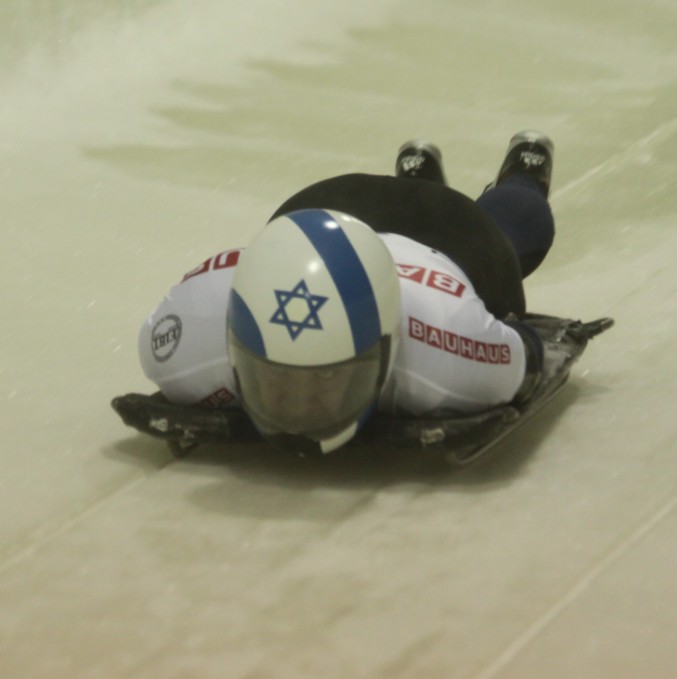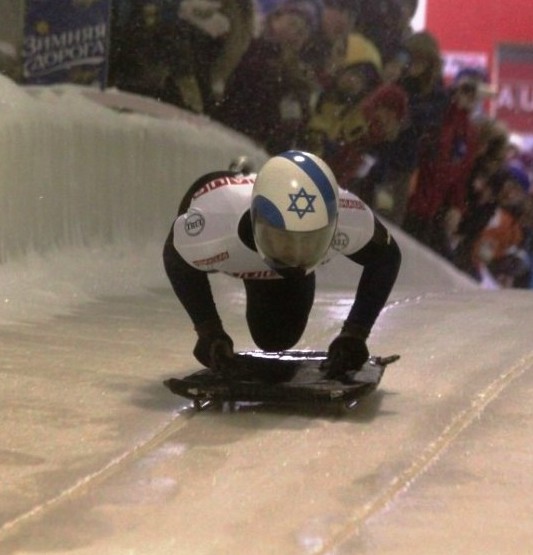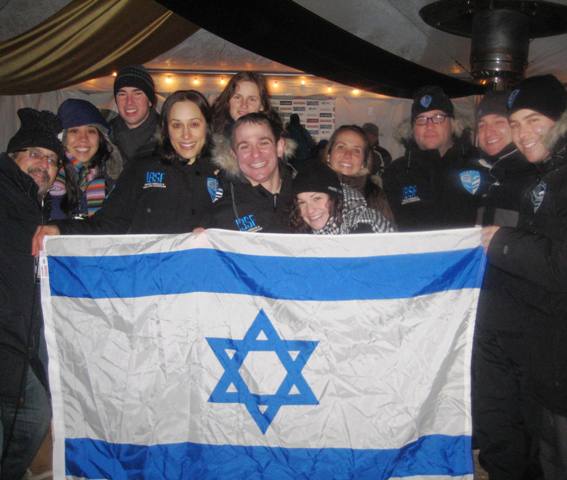 |
| Greaves |
But the 43-year-old Winnipegger, who is the Director of Development and Marketing for the Jewish Foundation of Manitoba and an honored member of Manitoba’s Jewish Sports Wall of Fame, was drawn back into a sport that was once, and might still be, an oxymoron for most young Jewish kids – World Championship Bobsledding.
Greaves has only recently returned from Lake Placid, N.Y., where he was doing some schmoozing, watching Israel’s newest sliding athlete and, in a different sort of way, putting the old band back together.
David Greaves’ days as a world-class athlete may have passed him by, but his love for the sport that brought him to the world stage, has never waned.
“A couple of years ago we came across a skeleton athlete,” said Greaves, who is now the Secretary General of the Israeli Bobsleigh and Skeleton Federation.
“At the end of 2010, Brad Chalupski was on the low end of the United States Development Team. There were about 15 people ahead of him. But he was from New Jersey and he was one of us, so we approached him and suggested he should slide for Israel.
“Last year, he competed in the World Jr. Circuit and we’re hopeful that he will continue to improve and perhaps qualifies for the 2014 Olympics.”
These days, Greaves is a behind-the-scenes guy, but in Lake Placid last month, he admitted that all the memories that made him one of the most intriguing athletes ever produced in Manitoba, came flooding back.
At home in Winnipeg these days, David Greaves is a family man. His wife Tracy, a cantor at Etz Chayim Synagogue, and his two kids, daughter Nesya and son Aaron, merely watch bobsledding on TV, but 10 years ago, Greaves became a phenomenon. In fact, what Greaves and his teammates accomplished with the first Israeli Bobsled Team would probably have made for a great movie had Jon Turtletaub, John Candy and Doug E. Doug not made “Cool Runnings” first.
“This job that I have today with the Foundation allows me to stay involved in the sport,” Greaves said. “I’m six years removed from the sport as an athlete, but I can’t believe that as a Jew and a Zionist and a person who always wanted to do something for Israel, this role has been offered to me. Little did I know that the greatest thing I would do for Israel is ride in the back of a bobsled.”
The original Israeli Bobsled team was started by former United States Air Force Top Gun, Aaron Zeff, and former San Francisco 49ers offensive lineman John Frank. Both lived in San Francisco and at the 2002 Olympics in Salt Lake City, came to believe that an Israeli bobsled team could train and eventually compete at the Olympic level.
 |
| Greaves, Director of Marketing Tamar Simon, and CFO Philip Nathan |
“I got a call in 2002 from Aaron recruiting me,” Greaves recalled. “So I agreed to meet John and Aaron at the track in Calgary and the first question that everyone had was this: ‘Can these guys get the sled to the bottom of the hill?’”
After one frightening crash, they eventually did complete the course, and as a group, they trained, improved, got their Israeli citizenship papers and eventually formed the country’s first Bobsled and Skeleton Federation.
So on a late December day in 2002, almost 10 months after the 2002 Salt lake Winter Olympics, Greaves heard the most gut-wrenching and yet heart-warming words he’d heard in his 33 years on the planet.
“I heard the public address system at Calgary’s Olympic Park say something that has been burned into my memory,” he said with a chuckle. “The track is clear for Israel 1.
“Being on the international stage at that race made me realize that I was part of a global Jewish community. There I was, a proud Canadian, representing Jews everywhere with my teammates. The Jewish connection really hit home when one of my teammate’s urged me to say the Shema before we went hurtling down the track. I was in that moment of realization when I he was wearing the Magen David and suddenly representing the Jewish homeland and the Jewish people in international sport.”
Amazingly, it got even better.
In two years, this small band of Jewish jocks had become a well-oiled machine, good enough to qualify for the 2004 World Championships.
“That was the year the World Championships were held in Konigsee, Germany,” Greaves recalled. “Our goal, from the day we started to put the team together, was to qualify for the Olympics in Torino, but getting to the world championships in Germany, representing Israel, was something I’ll never forget.”
Even for Greaves, the scene was surreal. After all, the team was competing in the Bavarian countryside at the base of a hill upon which sat the Eagle’s Nest, a chateau that was used as a retreat by Adolph Hitler.
In front of a German crowd of more than 10,000, a crowd that cheered wildly for a team from Israel as it entered a huge auditorium for the Opening Ceremonies escorted by a German child carrying the Israeli flag while a German orchestra played Hatikvah.
“I got chills,” Greaves said. “It was a powerful moment in my life, both as an athlete and as a Jew. I was in tears, and it solidified my desire to engage in Jewish community life. I went home and told my wife that I was going to quit my job and volunteer to work in the Jewish community. To be in Germany, having German fans cheer for us with a German band playing Hatikvah in the shadow of the Eagle’s Nest was a defining moment in my life as a human being, as a Jew and as a Zionist.”
Greaves’ team never did qualify for Torino, but the experiences they enjoyed together left an indelible legacy that is still very much alive today.
And it’s still alive because David Greaves was able to make the transition from athlete to head of the federation that he was instrumental in creating.
“I’m so grateful for what the sport did for me as an athlete and in lighting that Jewish flame for me,” he said. “We have a couple of very impressive athletes in our stable now and I don’t think we’re too far away from having serious Olympic medal contenders representing Israel.
“If I’ve learned anything it’s this: Every athlete from every country at the Olympics or World Championship has pride in his country, his flag and his team. But a Jewish athlete is different. His country is not just a country, but a people. And when you represent the Magen David in an international event everyone is watching you. Everyone has an opinion – good or bad – about Israel, based upon what they’ve seen in the media. But from what I experienced, no matter the country, athletes from around the world, when they see a Jewish athlete step on the field or the ice, they will cheer. That’s the power of the Magen David and it’s what solidifies the nation of Israel.
“My point is this: We all have a Jewish spark, a pilot light if you will. As Jews, we are obligated to find what it takes to turn that spark into a flame that helps us live meaningful, happy lives in our communities. Powerful moments and deep experiences await us all. Eight years ago in February, I had one of those deep, powerful experiences.”
It was an epiphany for Greaves, a experience that gave his life clarity and an experience will resonate with him for as long as he lives.





